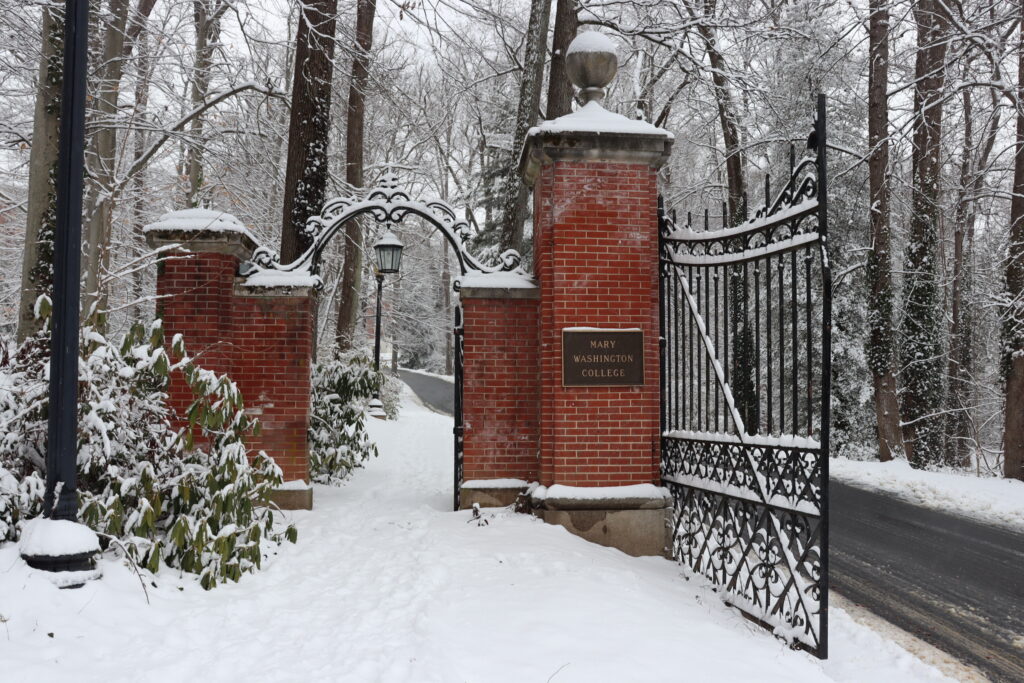University Faculty Council Alternative Terms Committee explores options for return of January term
3 min read
UMW University Faculty Council considers reinstitution of the J-Term. | Sarah Sklar, The Weekly Ringer
by SHELBY GRAY HERZOG
Staff Writer
Since 2021, the University Faculty Council’s Ad Hoc Alternative Terms Committee has been exploring options for alternative academic terms, namely a three-week January Term, or J-Term. The committee aims to have a finalized report to the council this school year, according to Michael Benson, chair of the committee and assistant professor of theatre.
“The impetus for investigating an alternative term was the inclusion of a J-Term in UMW’s 2020-2021 academic calendar,” said Benson. “The term was included in the academic calendar due to the revised winter break due to the pandemic. Many students and faculty who participated in those classes reported a positive experience. This prompted the UFC to investigate an alternative term further.”
At the Nov. 30 council meeting, the committee shared results from a faculty survey, which received an estimated 31% response rate, according to the meeting minutes. The committee has not yet presented the official report.
Based on the survey results, 71.4% of respondents were in favor of bringing the January term back, and 28.6% were opposed.
The survey asked faculty members about three different options for the January term.
“A majority of faculty supported extending contracts by 3 days to allow for a J-term and Saturday graduation, instead of having a contract pause or holding graduation on a Wednesday,” according to the meeting minutes.
After preliminarily analyzing the results of the survey, the committee is recommending the term start in January as opposed to December. After speaking with support staff, such as those working at the Speaking and Writing Center, library and help desk, would not be available in December. Under this schedule, commencement would fall one week later than currently scheduled, but would still be on a Saturday.
One issue the committee is working to address is that faculty not teaching during the January term would not be paid for service work they perform.
“This plan would require additional days of work without compensation,” the Nov. 30 meeting minutes said. “For example, those teaching a J-term would be compensated for work done during this time (including service work), but other faculty not teaching the J-term who are asked to attend to service roles would be doing service work without compensation.”
When it was held two years ago, the goal of the three-week January term was to provide students with a nuanced experience and allow both students and faculty new opportunities. It was considered an additional mini-semester for students who wished to fulfill a requirement in the downtime of winter break, as well as a chance for students to catch up on credits if they were behind.
Additionally, the January term generated a total revenue of $395,566, according to an article in The Weekly Ringer.
Many students are in favor of holding another January term.
“I don’t see any reason why it shouldn’t happen,” said Isaac Huling, a senior political science major.
Senior philosophy major Mary-Elise Alworth is also in support of the January term coming back.
“I think that it is beneficial for students who are on an accelerated path in their undergraduate studies,” she said.
Some students wish they could have participated in the term before graduating.
“I wish I could’ve participated in it,” said Jane Delaney, a senior philosophy: pre-law major.
“It’s unfair that some people were able to graduate sooner just because they were able to do J-Term.”
As of Jan. 23, the committee is still working to gather information and have yet to present the totality of their findings to the council.
“The main thing that has stood out is how genuinely invested the faculty are in student success,” said Benson. “While not at all surprising, as this is what makes UMW special, it has been uplifting to see the care and concern from all areas of the UMW community through this committee’s work.”


